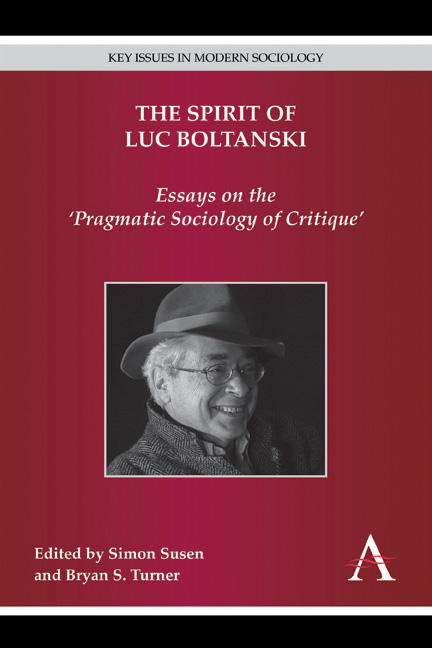Book contents
- Frontmatter
- CONTENTS
- List of Contributors
- Preface
- Part I Introductory Remarks
- Part II Luc Boltanski and (Post-) Classical Sociology
- Part III Luc Boltanski and Pragmatism
- Part IV Luc Boltanski and Critique
- Part V Luc Boltanski and Critical Sociology
- Part VI Luc Boltanski and Political Sociology
- Part VII Luc Boltanski and Contemporary Issues
- 18 Arranging the Irreversible: The Female Condition and Contradiction
- 19 Luc Boltanski and the Gift: Beyond Love, beyond Suspicion…?
- 20 The World of Worth in the Transhuman Condition: Prolegomena to a Proactionary Sociology
- 21 Luc Boltanski and the Problem of Time: Notes towards a Pragmatic Sociology of the Future
- Part VIII Luc Boltanski in Conversation
- Part IX Luc Boltanski and His Critics
- Index of Names
- Index of Subjects
18 - Arranging the Irreversible: The Female Condition and Contradiction
from Part VII - Luc Boltanski and Contemporary Issues
Published online by Cambridge University Press: 05 December 2014
- Frontmatter
- CONTENTS
- List of Contributors
- Preface
- Part I Introductory Remarks
- Part II Luc Boltanski and (Post-) Classical Sociology
- Part III Luc Boltanski and Pragmatism
- Part IV Luc Boltanski and Critique
- Part V Luc Boltanski and Critical Sociology
- Part VI Luc Boltanski and Political Sociology
- Part VII Luc Boltanski and Contemporary Issues
- 18 Arranging the Irreversible: The Female Condition and Contradiction
- 19 Luc Boltanski and the Gift: Beyond Love, beyond Suspicion…?
- 20 The World of Worth in the Transhuman Condition: Prolegomena to a Proactionary Sociology
- 21 Luc Boltanski and the Problem of Time: Notes towards a Pragmatic Sociology of the Future
- Part VIII Luc Boltanski in Conversation
- Part IX Luc Boltanski and His Critics
- Index of Names
- Index of Subjects
Summary
If Luc Boltanski's La condition fœtale : Une sociologie de l'engendrement et de l'avortement (2004) is a fearsome book, it is definitely not for the reasons one might expect given the subject matter. It is rather because of the simple fact that it restores a broken link: that between abortion and what it has just denied. A sociology of abortion depends on a sociology of procreation. More exactly, it means understanding abortion as a certain position in the problem opened up by procreation, as twofold natural and social processes: production of the living by the living, reproduction in the biological sense, and reproduction of society itself by the continuous flow that is required of new beings called up to incorporate themselves within it – even if it is one that is regulated in various ways.
One might think that by taking the problem from this angle, it puts abortion on trial once more. The point of view being taken is not that of the subject who is aborting and her rights, but rather of the appearance in court of the former in the name of the rights of the latter. This reading should be dismissed immediately. The ‘social problems’, if this category is meaningful, perhaps call for a sentence either for or against. This is not the same thing as the type of ‘social problems’ that the sociologist would deal with, the sort of problems which, in turn, certainly exist, since individuals experience them as such, and mobilize different emotional, cognitive, and practical resources to address them – without ever quite resolving them, which configures and, in fact, relaunches them as problems, in their persistence and historical transformation. It goes back to what is more worrying in this book: this is not that it removes the question of for or against, but, rather, that it puts the reader in a position to understand, and perhaps for the first time, what exactly is under debate, what is being talked about when a decision is made about a serious issue, what exactly is the seriousness of the issue.
- Type
- Chapter
- Information
- The Spirit of Luc BoltanskiEssays on the 'Pragmatic Sociology of Critique', pp. 471 - 484Publisher: Anthem PressPrint publication year: 2014



